|
For the better part of the last week, I have been on a pilgrimage with 18 youth and 4 other adults from Plymouth and Greeley First Congregational. The idea for this trip was born out of last year’s Confirmation class and my experience in my Pilgrimage class at Iliff. Our time was equal parts experiential learning, spiritual practicing, and (not enough) sleeping. We learned from and served with different communities in search of new or different expressions of the Divine Mystery. Ultimately, our hope was to foster deeper experiences of God for all participants on the trip. Now, I want to share some highlights of what we did.
Thursday We drove down to Crestone, where we were greeted with extravagant hospitality from Rev. Melissa and the Little Shepherd in the Hills Episcopal Church. We learned that Crestone is a town of 120 people, settled in Colorado’s geographically largest but demographically poorest Saguache county. Crestone is a funky little place, with no stoplights or restaurants and dozens of spiritual or religious centers. Decades ago, Crestone donated their land to religious communities who promised to show the world a better way of neighboring, and it became the spiritual hub it is today. Half of us slept in Little Shepherd’s historic log cabin chapel, and the other half slept in their fellowship hall. They let us use their kitchen, and all 23 of us shared their single bathroom. After settling in, we went to the Tashi Gomang Stupa. There are at least seven Stupas around Crestone, but this one is the largest and highest Stupa, offering beautiful views of the San Luis valley and a reverent meditative atmosphere. We learned about how people from the nearby Zen Center hike up to the Stupa each morning for meditation. Later that night, we hiked up to the Crestone Ziggurat for some stargazing. The Ziggurat had been built in the 70s by the father of the Queen of Jordan to be a place for personal prayer and meditation. The night we were there was clear and stunning. Many of our students had never seen that many stars. Personally, I’ve only seen the Milky Way that clearly a small handful of times. Question: if we started each day with such intentional practice, how would it change the way we live our whole lives? Friday First thing in the morning, we went to visit the MahaLakshmi Temple. Again, we were embraced with radical hospitality. We learned about their daily fire ceremony, engaged in some community service - cleaning, strawberry-picking, carrying fire wood, shop-keeping - and they fed us both breakfast and lunch. The fresh strawberries at lunch were just magical. One student said they tasted like sunshine. After spending a good deal of time with the community there, I was struck by their devotion to daily worship, spiritual practice, and universal welcome. We left the Lakshmi temple and went straight to visit the volunteers at the Crestone End of Life Project. They run the only open air funeral pyre in the country. This project and these people deal with death in a way that is altogether sacred, celebrant, reverent, and joyful. At the end of my life, I just might move to Crestone so that I can be sent off by COELP. Question: how can our churches embody the same radical engagement and nuanced approach to life and death? Saturday We spent the morning packing, cleaning, and working in Little Shepherd’s community garden. Several of the church members came to teach us how to garden. We prepped buckets of produce for the community food bank. One of Melissa’s congregants donated some of their local beef, and we used that and greens from the garden to make a taco bar for lunch. We offered our thanks and our goodbyes. Then we hit the road for Santa Fe, where we enjoyed an authentic New Mexican dinner at Tomasita’s before getting to the United Church of Santa Fe. United is a UCC church that started in the 80s, and Rev. Talitha Arnold has been with them almost since their beginning. She welcomed us in with a tour of the building, teaching us about how they have intentionally created their sacred church spaces to center the natural sacred environment of Santa Fe. They have a water feature in their sanctuary, which is adorned with wood and adobe bricks and bright windows. A walking path takes you all the way around the church, where they have several different spaces dedicated to outdoor worship services. Question: how do our sacred spaces and practices connect us to our environment? Sunday We joined United for an outdoor communion service. Some of our students got to read different parts of the liturgy. Immediately following, we were invited to watch their summer choir rehearse, which was a total gift. Together, we reflected on how United is different from Plymouth and First Cong Greeley. Rev. Talitha offered a sermon that encouraged us to find God in the Body of Christ, that is, the people of God who are the Church. That afternoon, we explored Meow Wolf. One of our students was able to crack the entire story - and if you’re familiar with Meow Wolf, you know that takes some work and lots of imagination. When we got back to the church, we journaled about finding the sacred in the creative artistry of that exhibit. Question: where are the most unexpected places that you have found God? Monday The Poeh Cultural Center tells the story of the Tewa People, the Spanish and Catholic colonization of New Mexico, and the Pueblo Revolution - the first fight for freedom in North America. This story is not told in many of our history books, but it gives important context for the cultural and religious landscape that today’s America was built on. Later, when we visited the Santa Fe Plaza, we were standing on the same ground where the Pueblo Revolution was won. Their story was told through native art like paintings, clothing, pottery, clay figures, and animation. After our time with the people at the Poeh Cultural Center, we made it to the Santuario at Chimayo. The students described this place as “heavy” and “peaceful.” There are photos and crosses and candles all over the grounds, each representing thousands of prayers. The dirt is holy. And again, there was art everywhere - statues, stained glass, mosaics, paintings, and wood figures to name a few. We learned about Guadalupe and saw how Chimayo is a spiritual pilgrimage place for Vietnamese, Native, Mexican, and Western Christians. That evening, we visited the Cathedral Basilica of St. Francis of Assisi. These grounds were also fully decorated with statues, mosaics, and stunning architecture. Through the whole day, especially following some of the religious motifs I had noticed at Meow Wolf the day before, I was moved by the devotion, care, and attention given toward creating and maintaining the beauty of these spaces. Question: where do we see our Creator in what we create? Tuesday We packed up and cleaned up first thing in the morning. United is one of the most simply beautiful churches I have ever got to spend time in, and we were so grateful to have their hospitality. We loaded up and visited the Santa Fe Farmer’s Market before hitting the road. There are plenty of other things I didn’t write about here - we went to the Sand Dunes, swam in some pools, danced downtown, and ate SO much good food. We also spent time each day doing contemplative practices together. Arguably, the most important aspect of a pilgrimage is the communitas - and these students built a special community that laughed and played and screamed and cried and prayed and will be with them for a long time. Thank you, Plymouth, for making experiences like this possible. We are cultivating a beautiful future Church. Brooklyn In church on Sunday, I shared about my experience with skiing for the first time. I have lived in Colorado for almost twenty years, and this past weekend I finally braved the slopes. A good friend of mine patiently taught me every step of the way, responding to my frustration with encouragement. She literally picked me up every time I fell. I thought this was a sweet picture of beloved community – I pushed myself to participate, and she met me exactly where I was.
I talked through this story with our youth group. I asked them how they imagined beloved community. One of our middle schoolers said that a ski lodge is the perfect place to experience beloved community. Up on a ski lift, complete strangers can become momentary friends. Everyone there understands the difficulty of walking downstairs with ski boots on, and everyone patiently waits. Openness, patience, and understanding were the top traits that our students picked out as necessary for beloved community. They agreed that in order to build a beloved community, you have to show up as your whole, authentic self and engage fully. Participants need to agree on a covenantal relationship of kindness and mutual respect. They said this seemed “utopian” – perhaps even impossible to achieve in the state of our world. But I believe God wants us to join in the work of making a better world. So, I asked them where they find glimpses of beloved community. Skiing. Drama club. Youth group. Boy Scouts. Their friends. Their families. Where do you find your beloved community? How are you making beloved community? How can we collectively move Plymouth towards our ideal beloved community? Look to this next generation. They get it. Brooklyn The first week of July, Mike and I took eight Plymouth students – joined by ten students & leaders from Greeley First Congregational – to the Rosebud Reservation in South Dakota. We partnered with the local Episcopal Mission, working hard for three hot days to help out around the Bishop Hare Center and a church in Parmelee. There was plenty to learn from the Lakota people who graciously spent time with us. We heard the truth of the way our government continues to mistreat and neglect the indigenous people of the land we live on. Hospitals on the reservation are naval hospitals, a subtle oppressive reminder. Due to the General Crimes Act, native law enforcement often loses their jurisdiction to the FBI. We heard stories about General Custer, Sitting Bull, and Spotted Tail. A man named Nico played traditional drum songs, teaching us about native music and prayer. The students learned to make fry bread from Rich Brokenleg. And it was delicious. We spent the first couple days cleaning up around our home base, the Bishop Hare Center. A house on the property had some pipes burst, so we moved out several years’ worth of furniture and belongings left behind by the intentional community that lived there. We did some yard work, reorganized a tool shed, and sorted old scrap wood. On the last day, we cleaned up the Church of the Holy Innocents in Parmelee after it had been broken into. A grocery store owner came by with a box full of popsicles to thank the students for their work. The trip was full of hard work and good learning, but we also had tons of fun. We played some typical youth group games, pet lots of rez dogs, got some ice cream, played kickball, and spent time getting to connect with each other. More than anything, I love to see our students building relationships with each other and with students from other progressive churches. So, while the week was exhausting, I was totally in my element. On a personal level, I was struck by two things. First, the Rosebud Episcopal Mission needs our help. I am excited to go again, and I am grateful for this partnership. Second, God is experienced across cultures and across history. God transcends all our human-made boundaries. As a seminary student, this is an idea I have encountered in my studies before. But on the reservation, with the Lakota people, I got to see it for myself. I will be carrying all of this with me for a long time, and I am so grateful that our Plymouth community gave us this opportunity. ] Brooklyn AuthorBrooklyn is Plymouth's Director of Christian Formation for Children & Youth. Brooklyn has served in local church and student ministries for the past several years. A native of northern Colorado, Brooklyn has professional experience leading in worship, youth, and children’s programs. Read her full bio here.  Image credit at bottom Image credit at bottom Of the many “minor” holidays we celebrate each year, I have always had a soft spot for Earth Day. I view it as a yearly reminder to celebrate the incredible gift of creation and to reflect on my role as a steward of that creation. In that spirit, our middle and high school youth groups decided to spend the month of April learning to become better stewards of our planet by focusing on issues related to climate change and sustainability. For me personally, climate change has always been a daunting topic to address--how do you even begin to approach a problem so massive, so urgent, and with such potentially devastating consequences for humanity and for all of creation? And furthermore, how do you approach this topic with young people who have inherited a planet on the brink of devastation and who have grown up acutely aware of the reality that they will likely be the ones forced to solve this problem that was not of their making? Rather than face the behemoth of discussing climate change as a whole, we opted to begin by talking about simple ways that we as individuals can live more intentional and sustainable lives. Our youth offered ideas ranging from the familiar (like using less water and recycling whenever possible) to the creative (such as researching microorganisms that could potentially digest plastic or other materials) to the… slightly out of the box (including an impressively detailed plan involving windmills, space lasers, and colonizing the Moon--the creativity of middle schoolers truly knows no bounds!). To put our ideas about sustainable living into practice, we collected old t-shirts that were destined for the landfill and converted them into reusable shopping bags that could replace single-use plastic bags. As we emphasized throughout our month of exploring climate change and sustainability, even the smallest efforts to be more intentional and sustainable in our daily lives can add up to big changes. Ultimately, solving a problem as immense and multifaceted as climate change will require a lot more than making reusable bags out of old t-shirts. It will require a lot more than recycling, using less water and electricity, and even creating space lasers and Moon colonies. In the end, our efforts to live more sustainably as individuals can only work if we also collectively put pressure on the governments and corporations who truly have the power to help reverse the effects of climate change on a global scale. But if there is one thing I took away from this month’s discussions with our middle and high school students, it is that their generation possesses everything we need in the fight against climate change: an awareness of the issues we face and the scope of the problem, an endless amount of creativity and unique ideas, and perhaps most importantly, a genuine optimism and belief that this problem, immense though it may be, is not insurmountable. I have no doubt that our youth are ready to fight for the health and longevity of their planet, and I can only hope that the rest of us are prepared to follow their lead. Alli AuthorAlli Stubbs is our interim Director of Christian Formation for Youth. Read more Image of earth from space: By NASA/Apollo 17 crew; taken by either Harrison Schmitt or Ron Evans. Link 1; (image link); see also. Public Domain, Wikimedia Link Many of you have asked me, "How was the mission trip?” You might have gotten a response along the lines of “it was great!” or “our youth are amazing!” or “it was one of the best I’ve ever been on.” While all true, those answers fall short. How do you summarize a week of spiritual growth, laughter, hope, challenges, systematic oppression, culture shock, hard work, little sleep, and intangible moments of grace? As much as I love to talk, I am at a loss for words to describe the transformational experience of spending a week at the Rosebud Episcopal Mission (REM). Every single day we were stretched outside our comfort zones and lived by the REM motto Semper Gumby (always flexible). Each day we built stronger relationships with members of our group. We laughed and played and at night we tried to get some sleep despite the symphony of snoring. Most importantly, every day God was made known to us. You will get to hear more of these stories from our youth at a Special Summer Forum August 11th at 11:15am. Until then, I’ll try to give you a better answer to “how was the mission trip” by using the same questions that our kids will be answering when they share their stories with you at the Forum. What is something you did (work or fun) while on the Mission Trip? Many of us worked at the wood barn helping to split freshly cut trees for the Fire Wood for the Elders program. Yes, FRESHLY CUT trees! Trees so fresh, when you tapped the splitter into them, water came out. Many elders have wood burning stoves to heat their homes but are not physically able to cut the wood they need for the long winter, they rely on their relatives for the wood. REM gives wood away to those who need it during the cold South Dakota winter. Walking down to the wood barn that first day, I felt that I was walking on holy ground. It is a sacred act to chop wood for strangers so they might have warmth and hope in the midst of a bleak winter. Our youth worked so hard and they did so from a place of love and faith. It was truly inspiring to watch. What is one thing that you learned? Every day we were at Rosebud, we had the opportunity to invite someone from the community to speak to us and teach us about the culture or life on the Rez. We learned about beading, the Lakota language, and games. We stumbled our way through traditional dances. Made fry bread and Indian Tacos and learned the history of the Reservations, food rations, and the oppression that the Lakota people live with every day. With all of that, what I learned was the capacity for compassion and understanding that our youth have for their neighbor. At times, their eagerness to learn, to listen, and to understand took my breath away. I am humbled to work with these teens and feel blessed to be their partner in ministry. How did you see God? For those of you who know me well, you know that I am NOT a morning person. I am known for being rather grumpy until that second cup of coffee kicks in. On one of these extra grumpy mornings, we headed up to the little chapel on top of the hill for Morning Watch. We already had a Semper Gumby moment of needing to be flexible and change plans for the day. I wasn’t exactly in the mood for the walk or the singing or really anything that wasn’t me going back to bed. Once we settled into the pews, Robbie Carlson the 1st Cong. Greeley youth leader, asked for song requests. We sang a few familiar tunes and ended with a youth ministry classic “Sanctuary.” Lord prepare me, to be a sanctuary Pure and holy, tried and true. With thanksgiving, I’ll be a living, sanctuary for you. As we sang, I could feel the Holy Spirit descend upon us. It moved me to tears. As the song ended we sat together in the stillness--as though God was saying in the midst of the busy week "Be still, and know that I AM God." What are you taking home with you? How has the Mission Trip impacted your life? On the Rez, hope is tangible and it looks like chopped wood, split by strangers. Every group who comes to the Rosebud Episcopal Mission spends time splitting wood at the wood barn. Every group takes home a piece of wood that they split so that they can tell the story of Hope on the Rosebud Reservation. This is what I take home with me. I bring home the hope that people will know they are cared for because their homes will be warm this winter. I have brought home the hope of young people who are living out their faith and answering God’s call to love your neighbor as yourself. It is easy to lose hope when you are listening to the news, but I have seen hope. It is a piece of firewood, it is a van full of teenagers driving to a mission trip. Hope is the people of God living out their faith, helping a neighbor in need, loving God and one another. Hope is alive. So, how was the mission trip? It was great. Our youth are amazing. This was one of the best mission trips I have ever been on. Grace & Peace, Mandy
|
Details
|
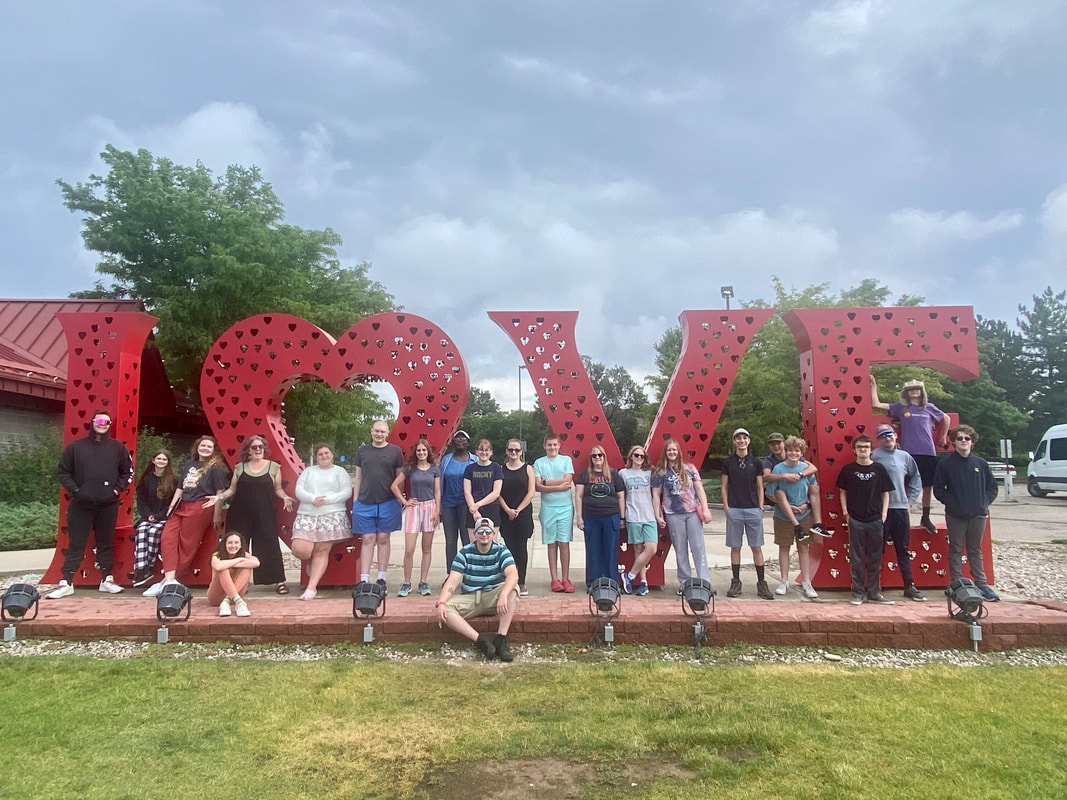
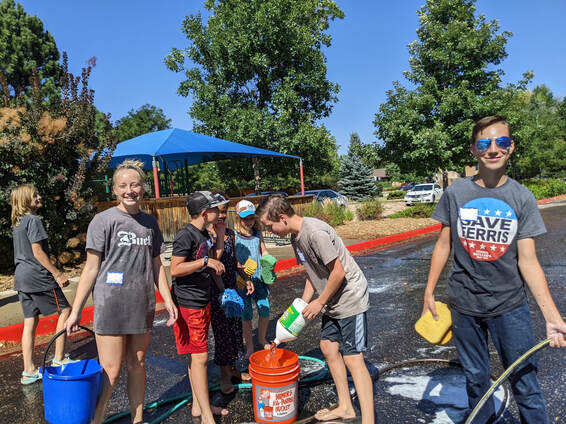
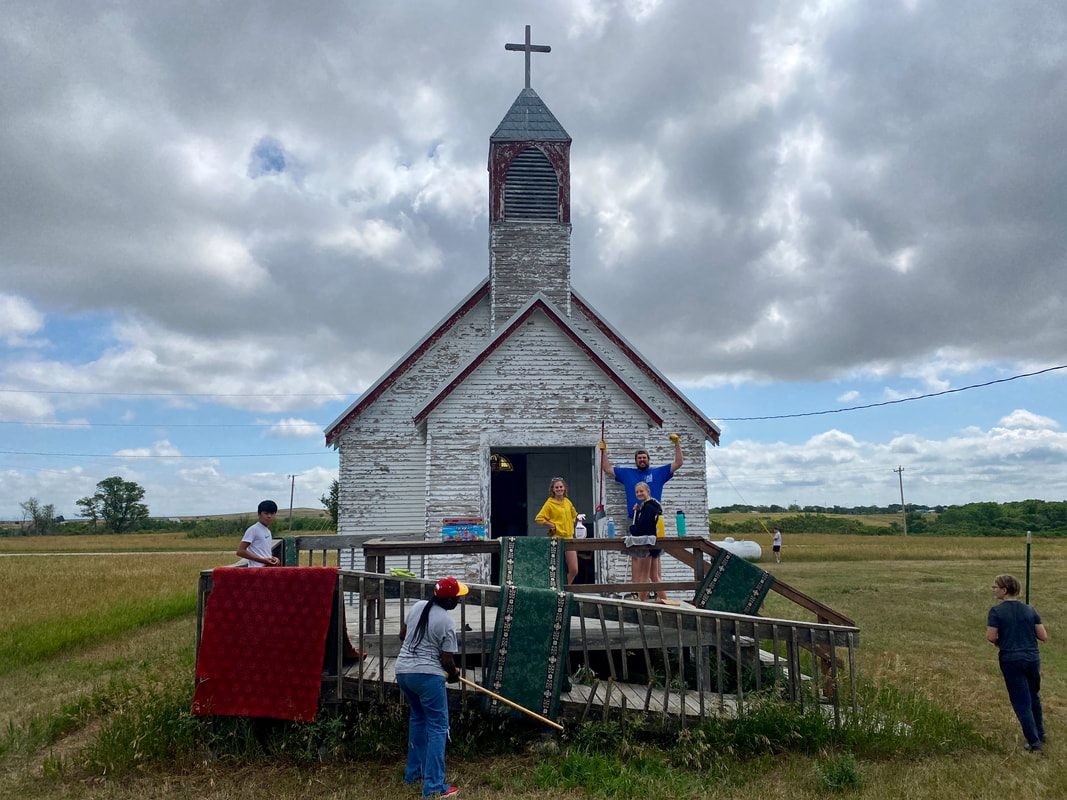
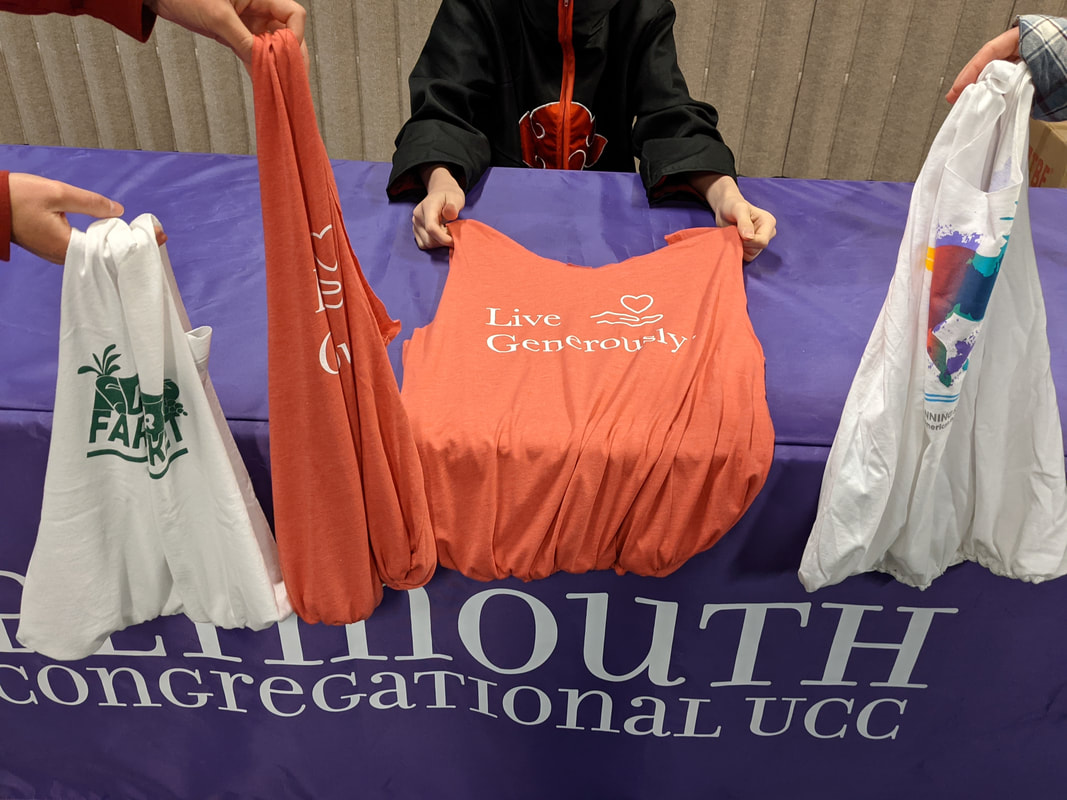
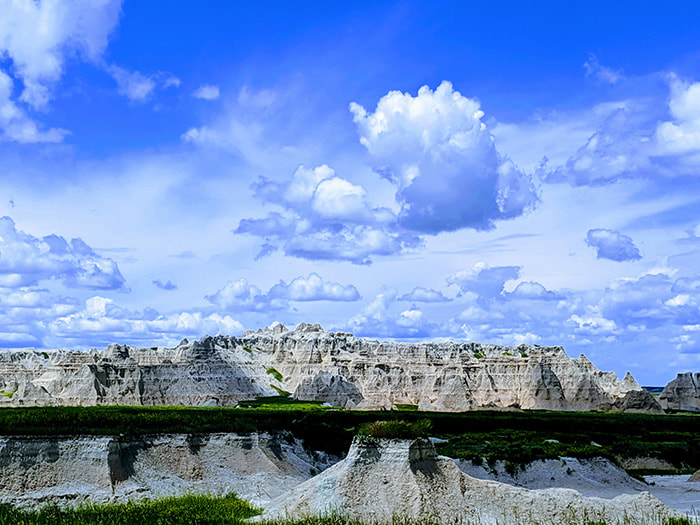
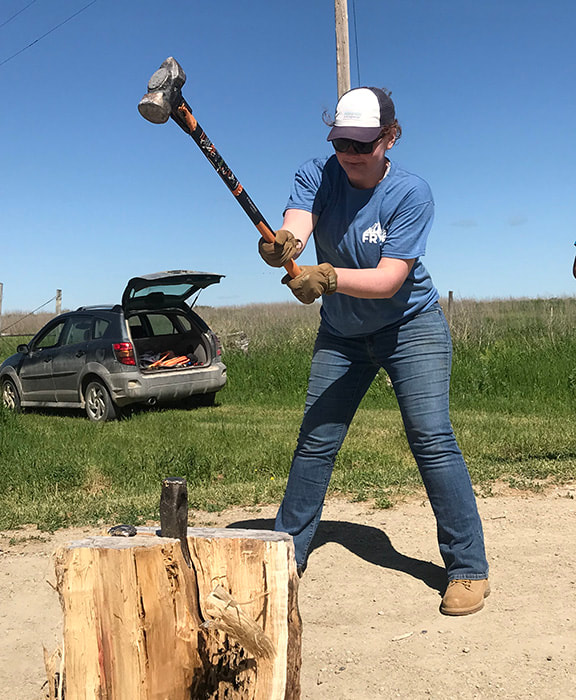
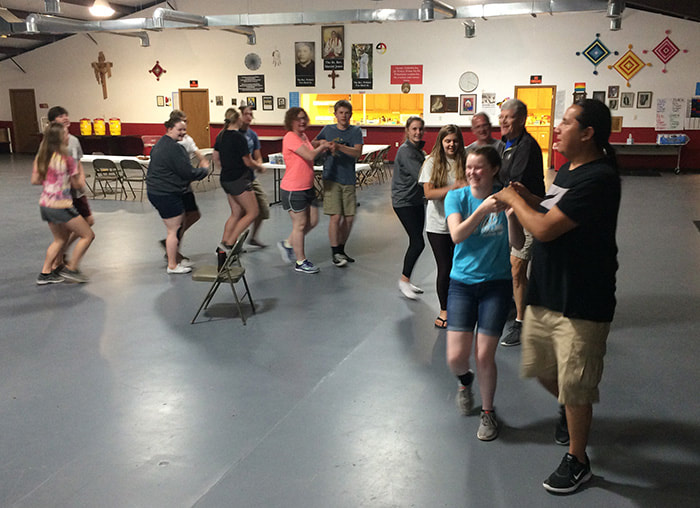
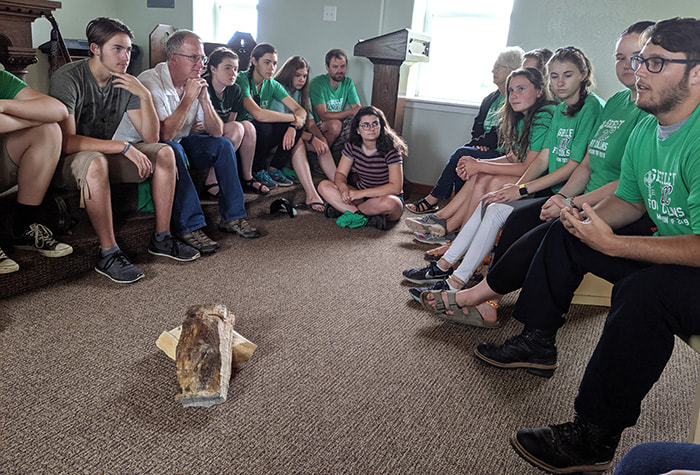
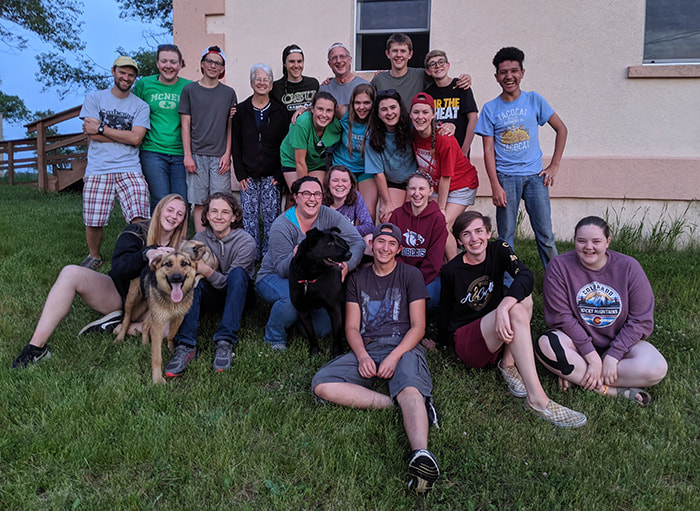
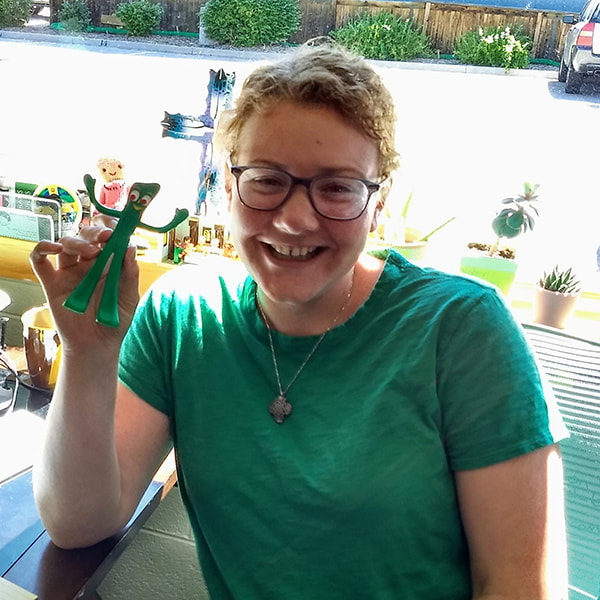
 RSS Feed
RSS Feed